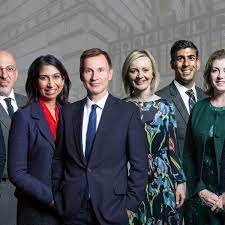Eight candidates have received enough nominations from their party’s members to advance to the first round of voting on Wednesday, where they will compete to succeed Boris Johnson as party leader and prime minister of the United Kingdom.
Only two candidates were unable to garner the required 20 nominations, leaving a large field of contenders vying for the party’s support by promising tax reduction, integrity, and serious governance in contrast to Johnson, who was forced to announce his resignation following a string of scandals.
The odds makers’ favorite, former finance minister Rishi Sunak, will compete against candidates like his successor Nadhim Zahawi and foreign minister Liz Truss in what is sure to be a contentious election.
A big task awaits the next British leader, and surveys indicate that support for the Conservatives is dwindling.
As citizens struggle with the tightest financial squeeze in decades, Britain’s economy is confronted by skyrocketing inflation, massive debt, and lackluster growth. All of this is taking place against the backdrop of a severe energy shortage that has been made worse by the conflict in Ukraine and driven up fuel costs.
As the competition heated up, opposing campaigns increased their private criticism of one another and pointed to potential financial or other issues that might be plaguing their opponents.
In an effort to set him apart from the other candidates who promised significant tax cuts, Sunak began his campaign by positioning himself as the serious one and promising “grown-up” honesty and “not fairy tales.”
In Sunak’s words, “it is not credible to offer lots more expenditure and lower taxes,” he added that tax cuts could only materialize if the problem of skyrocketing inflation was addressed.
After overseeing a significant increase in government spending during the coronavirus pandemic as finance minister, Sunak put Britain on track to have its highest tax burden since the 1950s. As a result, the majority of the other candidates have turned their fire on him by promising to oversee immediate tax cuts.
DIRTY TRICKS
The majority of Sunak’s coworkers who have openly expressed their opinions agree with his popularity.
Penny Mordaunt, a junior trade minister who is also highly anticipated, came in first place in a survey of Conservative party members and has attempted to use a more temperate approach when discussing taxes, arguing that it is not the right time to reduce government spending.
She stated on LBC radio that “the others would undoubtedly try to secure votes; they will try to throw up flares for specific caucuses.” Making extreme tax pledges and programs at this time is inappropriate.
The other candidates who will compete in the first round of the election are Attorney General Suella Braverman, the former health and foreign minister Jeremy Hunt, Tom Tugendhat, the head of the parliamentary foreign affairs committee, and Kemi Badenoch, a former junior minister who is gaining support from the right wing of the party.
Grant Shapps, the transport secretary, was the first contender to withdraw, endorsing Sunak, while Priti Patel, the home secretary (interior minister), stated she would not run.
Nadine Dorries and Jacob Rees-Mogg, two politicians close to Johnson who have also criticized Sunak, supported Foreign Secretary Truss.
Votes were allegedly loaned to Hunt’s campaign because they believed it would be simpler to defeat him, according to Dorries, who accused Sunak of adopting “dirty techniques” to rig the leadership race.
Despite being contacted for comment, Sunak’s group remained silent.
The field will shortly be narrowed down through more votes in the coming weeks, according to the 1922 Committee of Conservative Members of Parliament, which is organizing the campaign. The last two will then be chosen by the less than 200,000 party members by July 21.
On September 5, the winner and new prime minister of Britain will be declared.
In the meantime, the opposition Labour Party claimed that after blocking a Wednesday attempt to convene a vote of confidence on Johnson to remove him from office immediately, the government was “running terrified.”
The government claimed Labour was “playing politics” and said it would permit Labour to seek a confidence vote if Johnson’s name was removed from the motion’s text.

















